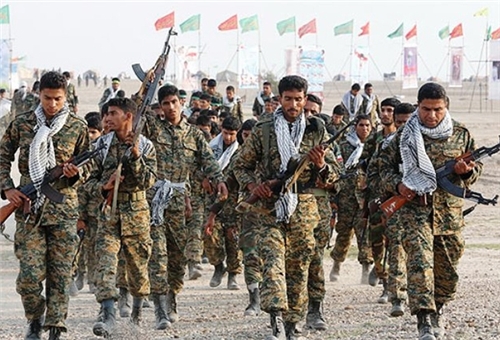by WorldTribune Staff, January 8, 2018
Iran’s Islamic Revolutionary Guard Corps (IRGC) said it has forcefully ended anti-government protests that officials in the Islamic Republic blamed on “foreign instigators.”
“Iran’s revolutionary people along with tens of thousands of Basij forces, police and the Intelligence Ministry have broken down the chain [of unrest] created … by the United States, Britain, the Zionist regime [Israel], Saudi Arabia, the hypocrites [Mujahideen] and monarchists,” the IRGC said in a statement posted on Jan. 7 on its Sepah News website.

Contrary to the IRGC’s statement, Radio Free Europe/Radio Liberty (RFE/RL) said it has received credible reports that protests continued in at least nine cities across Iran on Jan. 6, including Teheran, where social media footage showed gatherings despite a large police presence.
RFE/RL’s Radio Farda also reported it obtained credible reports on Jan. 6 from sources in Iran about overnight demonstrations against Iran’s clerical rulers in Takestan, Arak, Masjed Soleiman, Mashhad, Qazvin, Rasht, Lahijan, and Khomein, the birthplace of Ayatollah Ruhollah Khomeini.
The protests are the largest in Iran since 2009, when widespread unrest erupted over what analysts say was an obviously rigged election in favor of then-President Mahmoud Ahmadinejad. The IRGC and its Basij militia suppressed the unrest in 2009. Dozens of pro-reform Iranians were killed.
State media has stopped reporting on anti-government protests, but broadcast live footage of a fifth day of pro-government rallies organized by authorities.
While the Iranian government continues to insist the protests have been instigated by foreigners, a group of 16 prominent reformist figures living in Iran issued a statement rejecting that argument.
In the Jan. 6 statement, the signatories said, “Despite the fact the enemies of the country always try to take advantage of such events, we should know that any kind of foreign interference would not be possible without the existence of internal conditions.”
They added that, in addition to the government claim of foreign involvement being “an insult” to Iranians, it leads to “negligence toward the real causes of the protests.”
Meanwhile, access to the social media app Telegram remained blocked on Jan. 7, despite claims from Iran’s FARS news agency that the restrictions on Telegram had been “fully lifted.”
“The parliament is not in favor of keeping Telegram filtering in place, but it must pledge that it will not be used as a tool by the enemies of the Iranian people,” Behrouz Nemati, spokesman for the parliament’s presiding board, said.
Almost a third of Iran’s 80 million people use the Telegram app as their main source of news and as a way of bypassing highly restrictive state media.
Unlike the 2009 Green Movement, anti-government protesters over the last two weeks have garnered support from the United States. President Donald Trump has tweeted his support on several occasions.
The 2009 rebellion’s failure “was assured” by President Barack Obama, Jed Babbin, a deputy undersecretary of defense in the George H.W. Bush administration, noted in a Jan. 7 analysis for The Washington Times.
“Instead of helping the protesters, Obama criticized them, saying that they didn’t represent ‘fundamental change,’ ” Babbin wrote. “He spoke meekly, saying that, ‘The world is watching and inspired by their participation, regardless of what the ultimate outcome of the election was.’ ”
Babbin continued: “As these protests and the Green Movement of 2009 proved, the ayatollahs’ regime is vulnerable. Regardless of what happens to the Iranian protesters in the next weeks, Trump needs to act decisively.
“What Obama forbade in 2009 Trump should authorize in 2018. The CIA will have plans to fund and help the opposition organize fomenting revolution in Iran to oust the ayatollahs and return Iran to a semblance of freedom. That covert action can be authorized by a secret ‘presidential determination,’ which Trump should sign as soon as possible.”
Later this month, Trump will again have to decide on certifying Iran’s compliance with the nuclear deal.
“Last October he refused to do that. Now he can do more,” Babbin wrote.
Subscribe to Geostrategy-Direct __________ Support Free Press Foundation
